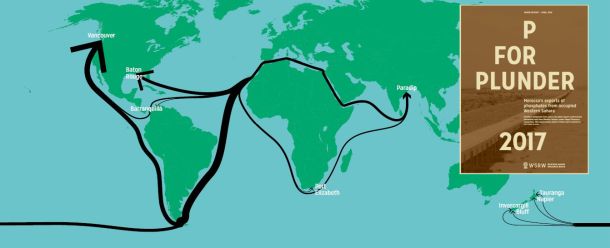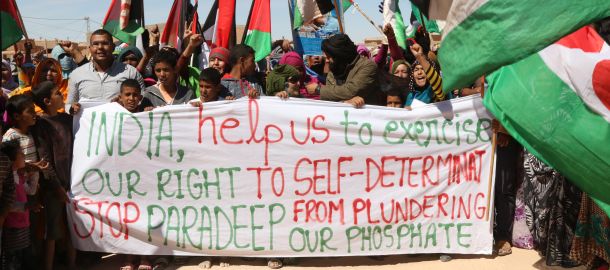
The Mail
By Simon Walters And Glen Owen
14 April 2012
Morocco, which runs the mining firm, annexed Western Sahara, where the tribesmen live, in 1975, enabling it to seize the world’s biggest phosphate reserves worth billions of pounds.
It embarked on a ruthless campaign of forced removals of Sahrawis to refugee camps and Moroccans were brought in to run the mines.
The United Nations has called for the ‘illegal occupation’ of Western Sahara to end and demanded the Sahrawis are given a vote on independence. Morocco has failed to comply with both requests.
It has also been accused of an orchestrated programme of ‘disappearances’ of independence campaigners in Western Sahara.
As a partner with international law firm Dechert, Mrs Clegg is said to be paid up to £400 an hour to advise OCP on corporate issues, and to represent its interests in the EU where Morocco is facing mounting protests over human rights abuses.
The disclosures come days after Mr Clegg offered to release his own tax returns, but said his wife should not be forced to do the same.
He said his tax affairs were ‘boring’, consisting solely of his £134,565 Deputy Prime Minister’s salary. However, neither the size nor source of his wife’s earnings – nearly four times greater than her husband’s – can be called ‘boring’.
The Mail on Sunday understands Mrs Clegg has worked as a legal adviser to OCP and its chairman Mustafa Terrab for at least three years. Mr Terrab, one of the most powerful men in Morocco, was appointed by autocratic King Mohammed VI and has been dubbed ‘the teacher’s pet’.
A Dechert spokesman refused to say whether Mrs Clegg worked for OCP, claiming ‘Dechert and Miriam Gonzalez Durantez [her maiden name] are under a legal obligation to maintain the confidentiality of our/her clients’.
The spokesman added: ‘Should we deny those clients she does not work for, it would be possible . . . to deduce which clients she works for.’
Pressure groups including Amnesty International claim that hundreds of Sahrawis ‘disappeared’ in Western Sahara at the hands of Morocco’s feared secret police. The victims included pregnant women, children and the elderly, according to a 1996 Amnesty International report.
Some were thrown out of helicopters or buried alive, it was reported in Spanish newspaper El Mundo in 2008, with hundreds more held in secret detention centres. The remains of 43 Sahrawi ‘disappeared’ were exhumed from secret prisons.
Two years ago, seven corpses were found by workers in a phosphate mine in Bou Craa, the centre of OCP’s operations. They were thought to be the remains of Sahrawi murdered by Moroccan forces.
Foreign Secretary William Hague has said he is ‘particularly concerned’ about ‘widespread human rights abuses’ in Western Sahara.
Morocco’s conduct in Western Sahara has also been criticised by Mr Clegg’s own Liberal Democrat MPs. Last month, Brecon MP Roger Williams challenged Environment Secretary Caroline Spelman in the Commons about whether ‘any UK companies or ships are involved in exporting phosphates from occupied Western Sahara’. She said she did not know.
Former EU official Mrs Clegg represented OCP – Office Cherifien des Phosphates – in her previous job as a lobbyist and legal adviser for City law firm DLA Piper.
When she moved to US rival Dechert last year, she took the OCP contract with her. It is understood OCP has paid more than £1 million for work carried out by the two companies. Mrs Clegg reportedly earns up to £500,000 a year at Dechert.
The Norwegian government has led international protests against Morocco’s phosphate industry. Last December it announced that it was selling more than £200 million of shares in companies that traded with OCP over ‘serious violations of ethical norms’.
Oslo claims that trade agreements between Morocco and the EU should not include exports from Western Sahara. Norway’s foreign ministry said: ‘Morocco does not have the right to exploit the area’s resources as if they were its own.’
Morocco is also at risk of losing a valuable EU deal on fishing rights off the Western Sahara coastline as a result of the human rights row. The EU cannot agree whether to insert a line in the agreement calling on Morocco to respect human rights in the region.
A report by the New York City Bar Association said Morocco should be banned from getting EU money for fishing rights without giving some of it to the Sahrawis. Defenders of OCP say the company has helped the Sahrawis by providing funds for education and health projects.
Mr Clegg has made human rights a cornerstone of his party’s policies. In a speech to the United Nations General Assembly in 2010 he urged it to take a tougher stance on human rights abuses.
He enraged his Tory Coalition partners by refusing to back plans to hold inquests behind closed doors and let MI5 ‘snoop’ on emails.
The Prime Minister has vowed to scrap the Human Rights Act – but Mr Clegg vetoed it.
Western Sahara, described as ‘the last colony in Africa’, was Spanish until it was annexed by Morocco and Mauritania in 1975.
Mauritania withdrew in 1979, leaving Morocco in charge of all land west of the Berm, a 930-mile sand and stone structure.
Critics accused the Moroccans of mounting the occupation to plunder phosphate deposits, used for fertiliser, in the Bou Craa area. The mines earn £4 billion a year for Morocco.
When King Mohammed VI took the Moroccan throne in 1999, he promised to improve human rights.
But campaigners say that while the practice of ‘disappearing’ has stopped, the abuses have continued, including the torture of Sahrawis.
The disclosures about Mrs Clegg’s work in Morocco could lead to searching questions in her native Spain – significantly one of the biggest buyers of OCP phosphate. In December 2010, the Spanish parliament condemned the Moroccans for attacking a Sahrawi camp set up to protest against their treatment.
In a report in French newspaper Le Monde this month, a Sahrawi woman was quoted as saying: ‘It was total chaos. Children were crying and we were evicted from the site with truncheons, tear gas and water cannon. They forced me to say “Long live the king, long live Morocco!” ’
Last night, talking to The Mail on Sunday from a refugee camp for displaced Sahrawis, Briton Danielle Smith, from the pressure group Sandblast, said: ‘Morocco has been systematically abusing the rights of the indigenous Sahrawi people.
‘Today’s revelations mean Mrs Clegg is morally obliged to raise the issue of human rights with her husband to redress this situation.’
Labour’s Lord Foulkes, a former International Aid Minister who has visited Western Sahara, said: ‘Bearing in mind Nick Clegg’s stand on human rights, we’re entitled to know full details of his wife’s business dealings in this sensitive area.’
Read more: http://www.dailymail.co.uk/news/article-2129900/Miriam-Clegg-paid-400-hour-mining-giant-accused-trampling-rights-Saharan-tribesmen.html#ixzz1s61SJoCo
New report: Western Sahara phosphate trade halved
The export of phosphate rock from occupied Western Sahara has never been lower than in 2019. This is revealed in the new WSRW report P for Plunder, published today.
New report on Western Sahara phosphate industry out now
Morocco shipped 1.93 million tonnes of phosphate out of occupied Western Sahara in 2018, worth an estimated $164 million, new report shows. Here is all you need to know about the volume, values, vessels and clients.
New report on contentious Western Sahara phosphate trade
Morocco shipped over 1.5 million tonnes of phosphate out of occupied Western Sahara in 2017, to the tune of over $142 million. But the number of international importers of the contentious conflict mineral is waning, WSRW's annual report shows.
New report on global phosphate trade from occupied Western Sahara
Over 200 million dollars worth of phosphate rock was shipped out of occupied Western Sahara last year, a new report from WSRW shows. For the first time, India is among the top importers.



